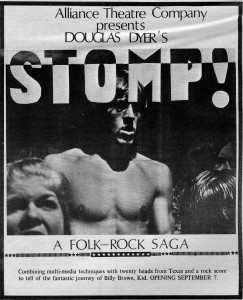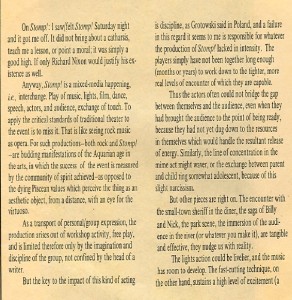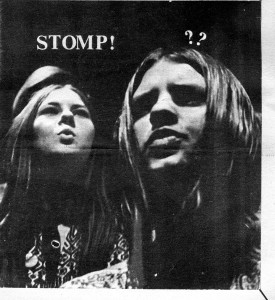The Great Speckled Bird Sept 8,1969 vol. 2 #26 pg. 15
Cultural stomp
 Atlanta theater has been dying a painful death for the past several years. And Atlanta audiences have been suffering from cultural deprivation. But Michael Howard, director of the Alliance Theater is taking a step to improve the situation.
Atlanta theater has been dying a painful death for the past several years. And Atlanta audiences have been suffering from cultural deprivation. But Michael Howard, director of the Alliance Theater is taking a step to improve the situation.
On September 6, a group of young people from Austin, Texas, is giving Atlanta an opportunity to witness what may be part of the rebirth of theater.
Mixed media-a live rock band, film, song, audience-actor participation—is combined with the story of a kind of Everykid in the new and exciting way of communicating what these young people are trying to say.
“Stomp” is an experiment in communal Theater. Under the direction of Douglas Dyer, the “Stomp” cast has been living and working together since the play was first created. Although it uses a tightly structured plotline, it is also an experiment in breaking down the antiquated isolationism of the audience and drawing the audience into participation. It is an experiment in speaking with eyes, hands, minds—not just stage voices. It is an experiment in which Atlanta audiences must participate in order to understand.
If this new, relevant, real theater is to survive, people must open their minds and support it by involving themselves in the experiment and remembering it.
Opening Saturday, September 6, at 8:30 p.m. Be there and be open.
—Pam gwin
Bucky Wetherell was with STOMP. Listen to his interview.
STOMP!, written and directed by Douglas Dyer, in the crypt of the Mausoleum for the Arts.
Nothing is so flaccid as an idea whose time has come and gone. The idea for Hair was timely conceived, executed, and fully realized. Stomp! is an almost-frank attempt to exploit the concept of Hair, to resonate to its sounds, and to reproduce the responses to it. Stomp! is too tiny in conception and too weak in execution: it is almost a tiptoe.
The performers are young, from the University of Texas, where the show started as a campus production. They try hard and are almost enthusiastic most of the time. I, too, tried hard. I really worked to believe. In the end 1 could not believe; the show said nothing to me. 1 kept the beat of the music even when (most of the time) I could not hear the words. The words I heard eddied around in an intellectual circle, in the service of no central conception.
The message of the show is purportedly revolution, but it is an all-purpose revolution, one uniting or deceiving everyone and no-one: the clichés of brotherhood, war-resistance, sexual liberation, and left liberalism. In the end you stand on the lawn outside, the Experience past and quite meaningless to you.
Some of the media things come off; some of the people are obviously very good people; some of the ideas were very good ideas and now entitled to a dignified old age. These do not make a play. Go. It only costs $3. Try very hard, and see how hard you can work, without direction, to accomplish nothing.
– Morris brown
 The Bird wails: “Atlanta theater has been dying a painful death for the past several years.” But hail the new hero: Michael Howard comes. Stomp in hand. offering a mixed-media novelty.
The Bird wails: “Atlanta theater has been dying a painful death for the past several years.” But hail the new hero: Michael Howard comes. Stomp in hand. offering a mixed-media novelty.
But that is all wrong. Theater has been dying/not in Atlanta but in the West, the same painful death that all culture must undergo before revolutionary rejuvenation or eternal mummification. The best of it, the Living Theatre, Che, are merely crumbs from the grand repast of the future at best or a safety-valve offering moments of escape from an eternity of perversity.
Nor did the theater ever die in Atlanta: it was never alive here to begin with! Not, at least, in the grand sense, but only in the form of a few experimental fragments most notably at the Academy Theater and, lest we forget, Arthur Burghardt’s efforts in Dutchman. True, Atlanta has built an imposing mausoleum for a never-was theater as part of the High Museum, ranking just below Rich’s as an architectural wonder. Stomp, then, may he fine despite the company it keeps. But the real theater cannot be reborn where it never lived, certainly not in the High Museum. Theater must be now where the people are: there, out there, at work, at play, at war, at death, at hunger. In the streets: guerilla to date, not too successful here, despite tremendous success elsewhere, but that’s where it’s at or got to be at. Not the Atlanta Pop Festival, but the aftermath in Piedmont Park was the real. Not what the people from Austin can do on the stage, but what we all do here: that’s real. Possible scenarios: Riot on Fourteenth Street, Layout on Bird Night, Park Scene on Sunday, County Jail, etc. In fact, they’re all being staged, again and again, nor is there any danger of a future takeover alienating the spontaneous culture from the community by the activities of culture sharks a la [Steve] Cole. It’s ours, because we live it.
Ted Brodek
